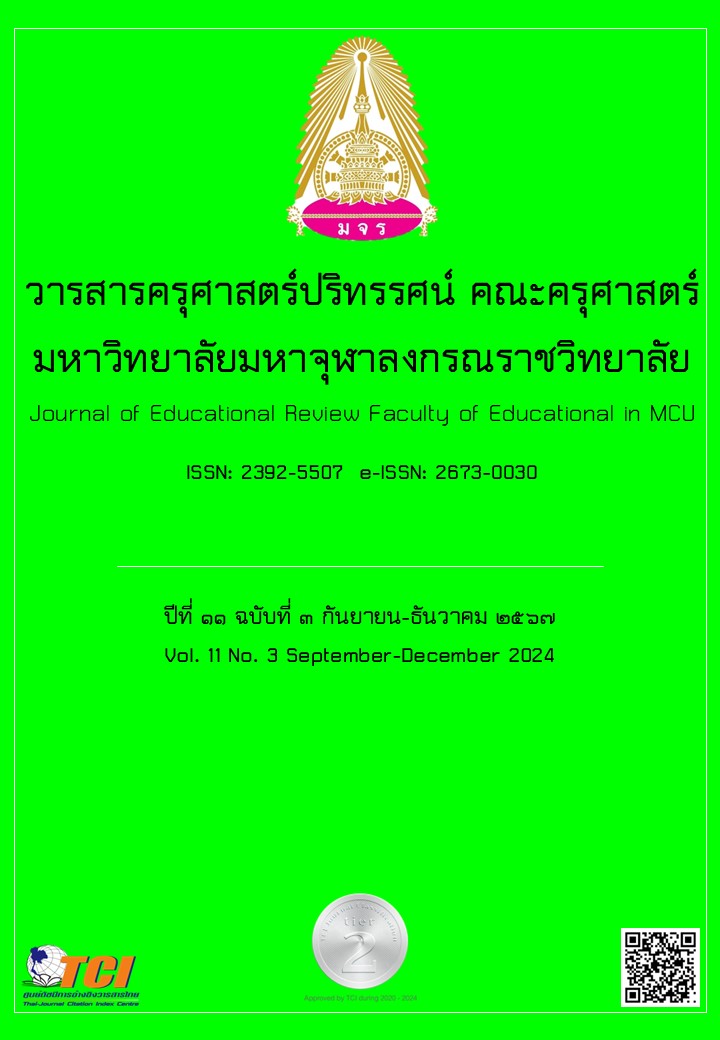THE GUIDELINES FOR DEVELOPMENT OF ACADEMIC ADMINISTRATION OF THE LEADING BUDDHIST-WAY SCHOOL IN THE NAKHON SAWAN EDUCATIONAL AREA ACCORDING TO BHAVANA 4
Main Article Content
Abstract
This research aims 1) to study the academic administration of leading Buddhist schools and 2) to propose guidelines for the development of academic administration of leading Buddhist schools according to the principles of the Four Bhvan (Development). This research is a mixed-methods research. The quantitative research used a questionnaire with a total population of 141 people. The research instrument was a questionnaire with a reliability of .97. Data were analyzed by finding frequency, percentage, mean, and standard deviation. Qualitative research used a semi-structured interview method by collecting important data from 9 people and analyzing the data by content analysis. The research results found that 1) the academic administration of leading Buddhist schools in the Nakhon Sawan Primary Educational Service Area had a high level of opinion overall. When considering each aspect, there were 4 aspects that had a high level of opinion: development of the school's curriculum, development of the learning process, measurement, evaluation, and transfer of learning results. In terms of educational supervision, respectively, and each aspect with a moderate level of opinions was research to develop the quality of education in educational institutions, and 2) the development guidelines for academic administration of leading Buddhist schools according to the principles of the Four Bhvan, which was the integration of the five aspects of academic administration with the principles of the Four Bhvan, namely, Kya-bhvan, (Physical development), Sīla-bhvan (Moral development), Citta-bhvan (Emotional development), and Paññ-bhvan (wisdom development), consisting of (1) In terms of curriculum development of the educational institution, the educational institution should create an environment that promoted learning and the development of personnel with virtue and ethics, organizing training to enhance skills and responsibility, creating a culture, fair policies, and providing opportunities for everyone to participate in decision-making. (2) In terms of learning process development, the educational institution’s inclusion in the administration process would help creating an educational institution with efficient operations, promoting research and development of teaching and learning in all subject groups, support learning that emphasized analytical thinking and problem solving. (3) In terms of measurement, evaluation, and transfer of learning outcomes, the educational institution had created and developed measurement and evaluation tools to meet standards that were consistent with learners, emphasizing on creating appropriate learning spaces for students’ learning, and inspires students to learn and develop themselves. (4) In terms of research to develop the quality of education, the educational institution supporting teachers to use research results to develop learning and the quality of education, creating an environment that was appropriate for learning and developing students both physically and mentally. (5) In terms of teaching supervision, educational institutions supporting and encouraging educational institutions to create a creative atmosphere and consistently promoting activities related to students and activities that enhancing the mind and happiness in learning, and creating an environment that would develop creativity.
Article Details

This work is licensed under a Creative Commons Attribution-NonCommercial-NoDerivatives 4.0 International License.
ทัศนะและความคิดเห็นที่ปรากฏในบทความในวารสารฉบับนี้ถือเป็นความรับผิดชอบของผู้เขียนบทความนั้นเพียงผู้เดียว และไม่ถือเป็นทัศนะและความรับผิดชอบของกองบรรณาธิการ
กองบรรณาธิการขอสงวนสิทธิ์ในการคัดเลือกบทความลงตีพิมพ์และจะแจ้งให้เจ้าของบทความทราบหลังจากผู้ประเมินบทความตรวจอ่านบทความแล้ว
ต้นฉบับที่ได้รับการตีพิมพ์ในวารสารครุศาสตร์ปริทรรศน์ คณะครุศาสตร์ มหาวิทยาลัยมหาจุฬาลงกรณราชวิทยาลัย ถือเป็นกรรมสิทธิ์ของคณะครุศาสตร์ มหาวิทยาลัยมหาจุฬาลงกรณราชวิทยาลัย ห้ามนำข้อความทั้งหมดหรือบางส่วนไปพิมพ์ซ้ำ เว้นเสียแต่ว่าจะได้รับอนุญาตจากมหาวิทยาลัยฯ เป็นลายลักษณ์อักษร
References
โครงการสถานศึกษาวิถีพุทธ.(2566). โรงเรียนวิถีพุทธชั้นนำ. แหล่งที่มา https://www.vitheebuddha.com/main.php?url=schoolt สืบค้นเมื่อ 1 มี.ค. 2566.
จิราวรรณ รินทรา. (2562). แนวทางการบริหารงานวิชาการแบบมีส่วนร่วมของบุคลากรสถานศึกษาในอำเภอสามง่าม สังกัดสำนักงานเขตพื้นที่การศึกษาประถมศึกษาพิจิตร เขต 1. วิทยานิพนธ์ครุศาสตรมหาบัณฑิต. มหาวิทยาลัยราชภัฏนครสวรรค์.
ณัฐธยาน์ จะนต. (2562). แนวทางการบริหารงานวิชาการของสถานศึกษา สังกัดสำนักงานเขตพื้นที่การศึกษาประถมศึกษานครสวรรค์ เขต 2. วิทยานิพนธ์ครุศาสตรมหาบัณฑิต. มหาวิทยาลัยราชภัฏนครสวรรค์.
พระธรรมปิฎก (ป. อ. ปยุตฺโต). (2560). พุทธธรรมกับการพัฒนาชีวิต. กรุงเทพมหานคร: ธรรมสภา.
เพ็ญพักตร์ มิ่งวงศ์ธรรม. (2560). การพัฒนาแนวทางการบริหารงานวิชาการที่มีประสิทธิผลของโรงเรียนในสังกัดสำนักงานเขตพื้นที่การศึกษาประถมศึกษานครพนม เขต 2. วิทยานิพนธ์การศึกษามหาบัณฑิต. มหาวิทยาลัยมหาจุฬาลงกรณราชวิทยาลัย.
ภูษณิศา วรสายัณห์, พระครูภัทรธรรมคุณ และพระมหาญาณวัฒน์ ฐิตวฑฺฒโน. (2565). แนวทางการพัฒนาภาวะผู้นำยุคดิจิทัลตามหลักภาวนา 4 ของผู้บริหารโรงเรียนขยายโอกาสทางการศึกษา สำนักงานเขตพื้นที่การศึกษาประถมศึกษาชลบุรี เขต 2. วารสารครุศาสตร์ปริทรรศน์ คณะครุศาสตร์ มหาวิทยาลัยมหาจุฬาลงกรณราชวิทยาลัย. 9(2). 335-345.
ศุภวรรณ สุธัมมา. (2563). แนวทางการบริหารงานวิชาการในโรงเรียนขนาดเล็ก สังกัดสำนักงานเขตพื้นที่การศึกษาประถมศึกษานครสวรรค์ เขต 2. วิทยานิพนธ์ครุศาสตรมหาบัณฑิต มหาวิทยาลัยราชภัฏนครสวรรค์.
สันติ บุญภิรมย์. (2552). การบริหารงานวิชาการ. กรุงเทพมหานคร: บุ๊คพอยท์.
สํานักงานเลขาธิการสภาการศึกษา กระทรวงศึกษาธิการ. (2558). ปฏิรูปการศึกษาเพื่ออนาคตของประเทศ ไทย มั่นคง มั่งคั่ง ยั่งยืน. กรุงเทพมหานคร: 21 เซ็นจูรี่.
อภิวัฒน์ จันทร์สม. (2563). แนวทางการบริหารงานวิชาการของโรงเรียนเอกชน สังกัดสำนักงานศึกษาธิการจังหวัดมหาสารคาม โดยใช้แนวคิดชุมชนแห่งการเรียนรู้ทางวิชาชีพ. วิทยานิพนธ์การศึกษามหาบัณฑิต. มหาวิทยาลัยมหาสารคาม.
Kate, M. (2022). Social and academic benefits of looping primary grade students. From http://www.sciencedirect.com/science?-ob= ArticleUR&- Retrieved 14 October 2023.
Smith, J. (2006). Technology-assisted Instruction and Student Advancement. Dissertation Abstract International.


